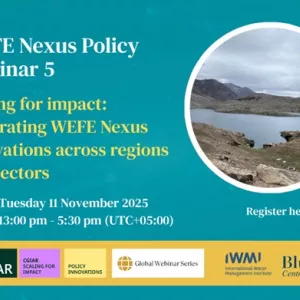Scaling for Impact: Integrating WEFE Nexus Innovations Across Borders and Sectors
Bridging science, policy, and practice to accelerate climate-resilient solutions in Central Asia By Maha Al-Zu’bi (IWMI & CGIAR Scaling for Impact Program AoW2 Focal Point) How can integrated approaches to water, energy, food, and ecosystems (WEFE) help transform agrifood systems and enhance regional cooperation? This was the central question explored during the regional webinar “Scaling for Impact: Integrating WEFE Nexus

Scaling for Impact: Integrating WEFE Nexus Innovations Across Borders and Sectors
Bridging science, policy, and practice to accelerate climate-resilient solutions in Central Asia
By Maha Al-Zu’bi (IWMI & CGIAR Scaling for Impact Program AoW2 Focal Point)
How can integrated approaches to water, energy, food, and ecosystems (WEFE) help transform agrifood systems and enhance regional cooperation? This was the central question explored during the regional webinar “Scaling for Impact: Integrating WEFE Nexus Innovations Across Borders and Sectors,” held on 11 November 2025, co-hosted by the International Water Management Institute (IWMI), under the CGIAR’s Scaling for Impact Program and Policy Innovations Science Program, as well as Blue Peace Central Asia.
“Scaling is not just about expanding reach—it’s about transforming systems,” emphasized Dr. Maha Al-Zu’bi, Regional Researcher at IWMI, who moderated the session. “It means aligning research, policy, and investments to create pathways for lasting impact.”
Bringing together more than 100 researchers, policymakers, and development partners from across the Middle East, Central Asia, and beyond, the webinar showcased how scaling Water–Energy–Food–Ecosystem (WEFE) Nexus innovations can strengthen climate resilience, boost resource efficiency, and accelerate sustainable regional development.
“Partnerships are at the heart of the WEFE Nexus,” noted Dr. Timothy Krupnik, Director of CGIAR’s Scaling for Impact (S4I) Program. “By aligning science, policy, and investment, we can scale proven innovations and create the enabling environment needed for systemic transformation.”
A cross-sectoral dialogue for action
Speakers from Middle East and Central Asia shared concrete examples of WEFE Nexus innovations in action — from smart irrigation scheduling and integrated basin planning to water-energy optimization tools. The discussions underscored the value of evidence-based collaboration in addressing Central Asia’s shared climate and water challenges.

Dr. Mohsin Hafeez, IWMI’s Strategic Program Director for Water, Food and Ecosystems, and Lead of the WEFE Nexus Area of Work under CGIAR’s Policy Innovations Program, added that “Integrating WEFE solutions into climate adaptation plans is key to strengthening regional cooperation and building resilience against increasing water scarcity and climate shocks.”
Key Messages
- Hydrodiplomacy and the WEFE Nexus: Integrating technical solutions with political dialogue is essential for sustainable and equitable transboundary water governance.
- Regional collaboration and coherence: Harmonized policies, joint data systems, and coordinated investments across borders strengthen collective resilience and resource efficiency.
- Trust, transparency, and inclusion: Building trust through data sharing, inclusive participation, and gender-responsive approaches enhances legitimacy and long-term cooperation.
- Scaling through systems thinking: Effective scaling of WEFE innovations requires linking research with enabling institutions, financing mechanisms, and capacity development.
- Evidence-based and people-centered innovation: Solutions must be grounded in science while addressing local needs, social equity, and ecosystem integrity.
- Learning for impact and South–South exchange: Cross–regional learning, capacity building, and replication of successful WEFE pilots—such as Blue Peace initiatives—drive resilience, peacebuilding, and sustainable transformation.
Dr. Barbara Janusz-Pawletta, IWMI Regional Representative for Central Asia and Lead of the Blue Peace Central Asia Initiative, emphasized that “Scaling WEFE Nexus innovations requires cross-sectoral dialogue, South–South collaboration, and shared governance mechanisms that recognize water as a connector across energy, food, and environmental systems.”
“Unless WEFE initiatives are connected to diplomacy, their objectives vanish in technical detail; linking them to political dialogue gives them power to build trust and shape agreements.” Dr. Hazim El-Naser, Former Minister of Water and Irrigation and Agriculture – Jordan, and Founder of Middle East Water Forum.
Next Steps: Driving Innovation and Collaboration Forward
Building on this momentum, IWMI and its partners will continue to advance the Scaling for Impact program by:
- Catalyzing regional learning ecosystems that accelerate the exchange and upscaling of WEFE Nexus innovations across borders.
- Fostering policy dialogues that connect national priorities with transboundary collaboration, ensuring integrated and climate-resilient solutions.
- Expanding strategic partnerships with ministries, UN agencies, and regional initiatives to unlock co-financing opportunities and embed long-term sustainability into Nexus-driven actions.
A recording of the webinar is now available on
News Coverage: Forum – Social Post

